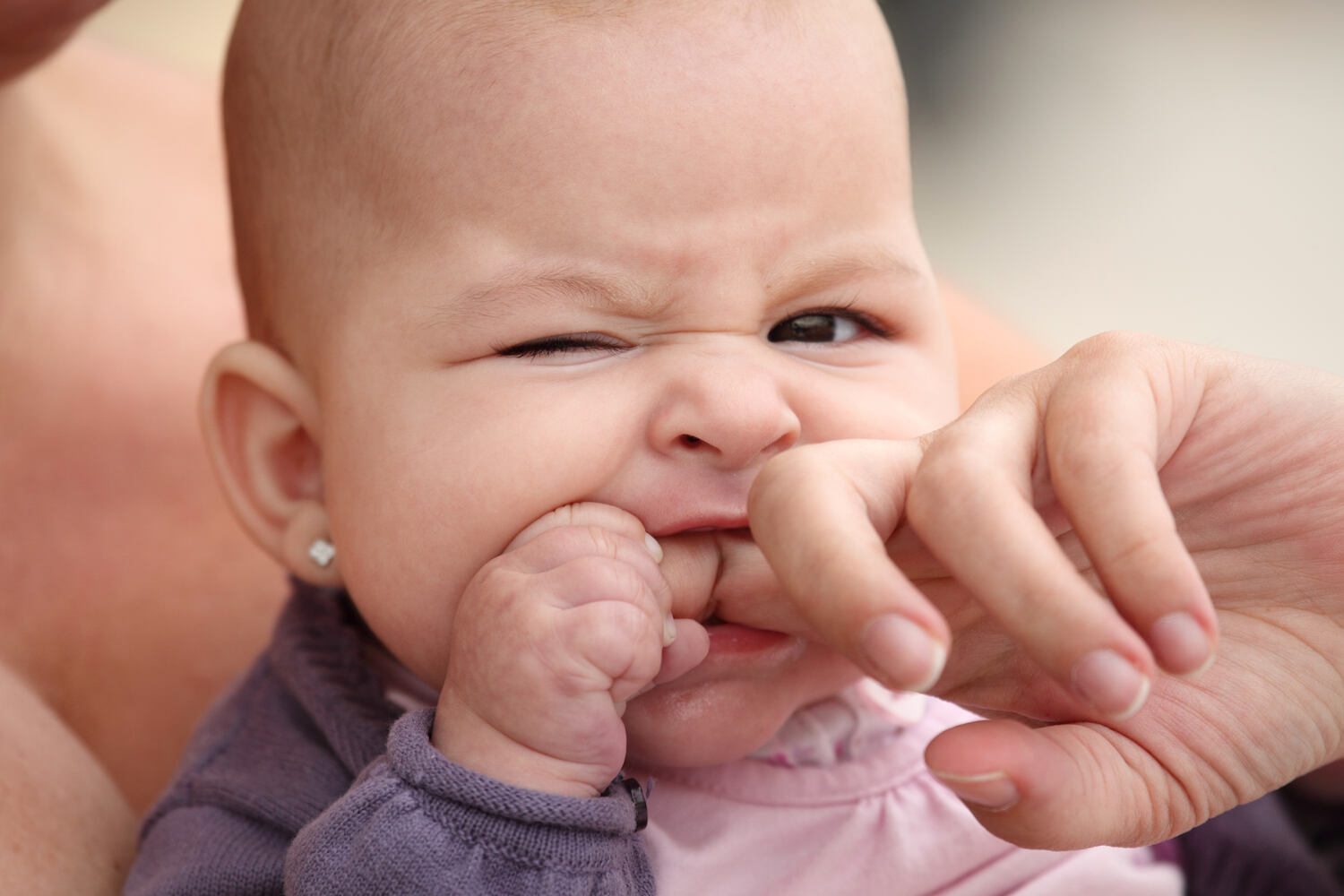
Cutting a tooth involves lots of aches and irritation for babies. The emerging teeth create pressure underneath the gums. And your cutie unknowingly bites and chews everything in their reach to counter-pressure it from outside. Although teething in babies starts at around 6 months of age, some babies may begin from 2-3 months. And the whole process may go up to 30 months of age [1].
Teething in babies causes inflammation and soreness in the gums. So, you should hand them some refrigerated teething toys to numb the pain. Other than that, if some home remedies don’t keep the teething symptoms in check, paying a visit to a doctor is recommended.
In This Article
- What is Teething?
- When Do Babies Start Teething?
- How Early Can a Baby Start Teething?
- What Teeth Do Babies Get First?
- Top 5 Common Signs of Teething in Babies
- List of Top 5 Tips to Soothe a Teething Baby
- How to Take Care of Your Baby’s Teeth?
- When to See a Doctor?
- FAQ’s
What is Teething?
Be it your cutie’s first smile, giggle, or rollover, it fills your being with sheer ecstasy. But cutting the first tooth is not a very pleasant experience for you and your baby.
The emergence of teeth from the gums is called teething [2]. Although teething is a noteworthy milestone, it provokes crying, distress, and sometimes even all-nighters! (for both baby and mama).
When Do Babies Start Teething?
Some infants begin to have teeth early on while others may take more time – teething time differs for babies, and it’s perfectly normal. Most babies will start to get those teeny-weeny white pearls from their gums at about 6 months of age [1]. But the signs of teething start to knock on the door when babies begin to get 2 or 3 months old.
How Early Can a Baby Start Teething?

A baby might get their first tooth when they are just around 3 or 4 months old. Moreover, some babies’ first teeth don’t erupt until they approach their first birthday.
What Teeth Do Babies Get First?
Babies usually get their first tooth usually at 6 to 7 months of age. But this may vary since every baby is unique. Several factors like genetics, birth weight, nutritional deficiencies, and socioeconomic status can influence teeth eruption in babies.
Here is a detailed overview of the sequence and timeline of teeth eruption in babies [3]
| Month | Teeth Errupted |
| 6-10 | Lower central incisors (front teeth) |
| 8-12 | Upper central incisors |
| 9-13 | Upper later incisors (side teeth) |
| 10-16 | Lower lateral incisor |
| 14-18 | Lower first molar (back teeth) |
| 14-19 | Upper first molar |
| 16-22 | Upper Canine (pointed tooth posterior to later incisor) |
| 17-23 | Lower canine |
| 23-31 | Lower second molar |
| 25-33 | Upper second molar |
Top 5 Common Signs of Teething in Babies

Teething is a different experience for every baby. In the case of some babies, no symptoms can be visually identified. However, several babies have to bear the pain and fussiness that comes with teething. Here are some common signs of teething in babies [4].
1. Sore, And Swollen gums
As the teeth poke through the gums, they become sore and inflamed. Increased inflammation can lead to swollen gums. You may also notice an eruption cyst which is a fluid-filled bubble appearing blue or grey.
2. Low-grade Fever
Though teething has no direct link to low-grade fever in babies, the increased gum inflammation may slightly raise the baby’s body temperature. However, any temperature more than 38℃ is a cause of concern and needs medical attention.
3. Loads of Drooling
You’ll be amazed to see the sheer amount of drooling that teething can cause. Your cutie’s tiny mouth starts these waterworks between the age group of 10 weeks to 4 months. The drooling may keep going until the dawn of each tooth. Drooling surely makes your darling’s clothes soggy. It’s as if your baby just came home from meditating beside a waterfall(just kidding!) Therefore, make them wear a bib, it will keep your infant tidy and clean. Further, wipe their chin from time to time, they’ll feel very comfortable.
4. Change in Eating And Sleeping Patterns
Erupting teeth can exert excess pressure and force within the baby’s gums making them more irritable and cranky. This can stress them out causing disturbed sleep. Gnawing gum pain and discomfort can alter their eating pattern and they may even refuse to be breastfed. Sucking milk while breastfeeding can aggravate the pain even more.
5. Ear Tugging and Cheek Rubbing
Teething pain in babies can radiate to their cheeks and ears. Your infant may constantly rub their cheek or tug on their ears. They do so to get rid of the pain, not knowing what it is. But remember, ear pulling is not solely a sign of teething but can also be due to extreme tiredness, or a symptom of an ear infection. So seek a doctor if your baby is acting furious with their ears.
List of Top 5 Tips to Soothe a Teething Baby

These parent-certified soothing remedies will ease your baby’s teething distress [5].
1. Gum Massage
You can use your finger or a wet washcloth and massage their gums. Applying gentle pressure on their gums can relieve pain and soreness. This may relax the baby and help them fall asleep.
2. Providing a Cold WashCloth
You can take a clean washcloth, drench and soak it in water, squeeze the excess water, and keep it in a refrigerator to cool it. Then offer this washcloth to your baby to chew on it. This relieves painful symptoms and relaxes your baby. However, remember not to leave them unattended since even a washcloth can be a choking hazard.
3. Refrigerated Items Can Be a Savior!
If your baby uses a pacifier, you can refrigerate it to cool it down before offering it to them. The cold temperature helps soothe the sore gums and inflamed nerve endings offering them relief from pain and discomfort. Likewise, you can place teething toys, and fruits in the fridge and then offer them for added pain relief. This eases their irritation and crankiness to a great extent.
Many mothers swear about using milk popsicles when their babies are teething. You can simply use your breastmilk and freeze it into tiny popsicles and offer your baby. This does not pose any risk of infections since it is a natural remedy.
Read: Stages of Teething in Babies
4. Cuddling Can Calm Your Baby
Sometimes those extra cuddles can work wonders! You can rock your baby gently which can help them relax and minimize their irritation. Extra feeding sessions can also calm your baby by creating a relaxing environment for them to fall asleep.
5. Seeking Help From a Pediatrician
When home remedies and cuddling sessions fail, seek help from your baby’s pediatrician as a last resort. They can prescribe medications that can relieve pain and soothe their aching gums. Always remember to give the recommended dose and medicine and do not try any over-the-counter teething gels that contain ingredients like lidocaine. They can numb their mouth and often be harmful when swallowed.
How to Take Care of Your Baby’s Teeth?

As weird as it may sound, you’ll have to brush those tiny pearls from the arrival of the first tooth itself! Start brushing their teeth with a gentle small-headed baby toothbrush and water once in the morning and once at night or as advised by the doctor. As the baby grows (around 9 to 10 months) you can gradually include a low-dose fluoride toothpaste. Remember, a grain-sized portion of toothpaste is enough for your baby at this age.
Also, be sure to avoid breastfeeding or bottle feeding your baby for longer periods, especially at night. Do not put them to sleep with a bottle since it can harm them due to the pooling of milk around their teeth. This can encourage bacterial colonization and increase their risk of tooth decay (baby bottle decay), and cavities. Furthermore, remember to limit their sugar intake like candies, chocolates, pastries, and sugary drinks [6].
[Read: How to Clean Your Baby’s Mouth]
When to See a Doctor?
It’s rare for health conditions like diarrhea and fever to be caused by teething. But you should let your doctor know if your darling has a fever or is not eating for a few days. You must seek a doctor if loose, liquid stools are accompanying your baby for more than two bowel movements.
Teething in babies is a huge milestone as a part of their growth and development. And all the pain that comes with it can easily be dealt with with your love and support. Your cutie will go through this phase with ease with all your remedies and attention.
[Read: Can Teething Cause Diarrhea In Babies?]
FAQ’s
1. Do Fever and Diarrhea Always Accompany Teething in Babies?
It has not been medically proven that fever and diarrhea are symptoms of teething. But parents often notice that these two are linked.
2. What to Expect When Babies Start Teething?
Teething can cause inflammation of the gums, the annoyance of eating, improper sleep, drooling, and a few more symptoms.
3. Do Pacifiers Help With Teething Pain?
A refrigerated, clean, and sterilized pacifier is a great solution to reduce your baby’s teething pain.
4. When to Start Brushing a Baby’s Teeth?
Start brushing your baby’s teeth as soon as they appear. As soon as your baby’s teeth erupt around 6 months of age, brush their teeth gently with a small-headed, soft-bristled toothbrush and water. A soft wet cloth can also be used to clean their tiny teeth and gums.
5. When is The Right Time to Make a Baby’s First Dental Appointment?
The right time to take your baby to a dentist for the first time is when their first tooth begins to erupt. However, ensure to make their visit as early as possible and not later than their first birthday.
6. How Long Do Teething Symptoms Last?
Teething symptoms in your baby can last for about a week and may resolve once the tooth erupts. However, every baby is different, and so the timeline may vary.
References
- Mothers’ false beliefs and myths associated with teething – [https://www.ncbi.nlm.nih.gov/pmc/articles/PMC7724255/]
- Teething in children and the alleviation of symptoms – [https://pubmed.ncbi.nlm.nih.gov/12415773/]
- Anatomy, Head and Neck, Tooth Eruption – [https://www.ncbi.nlm.nih.gov/books/NBK549878/]
- Symptoms associated with infant teething: a prospective study – [https://pubmed.ncbi.nlm.nih.gov/10742315/]
- Teething trouble and its management in children – [https://www.researchgate.net/publication/278003460]\
- Promoting parenting strategies to improve tooth brushing in children: design of a non-randomized cluster-controlled trial – [https://www.ncbi.nlm.nih.gov/pmc/articles/PMC6731582/]
